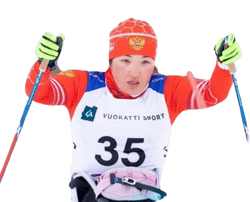Menu

asketball, uSA
Season 3
5
1
To kick off Season 2, we speak with 2x Russian Paralympian (soon to be 3x), biathlete and wheelchair racer, Akzhana Abdikarmova. She shares what it means to represent the Russian Olympic Committee (ROC) and sheds light on the invisibility of disability in Russia, how it has evolved, and how it hasn’t over the past 30 years.
Akzhana grew up with spina bifida and is constantly looking for ways to inspire local youth with disabilities; that’s why she started several Instagram accounts amplifying the experiences of disabled athletes (@Gromova Team and @Gromovateam_junior) . Akzhana says that young para athletes are the individuals who motivate her the most, especially throughout the pandemic when she’s been largely isolated: “I need to be their motivation and their role model. I’m doing this for them.”

Contributing experts include: Mary Yntema (President and CEO, WorldBoston), and Denise Roza (Founder and Director, Perspektiva).
Media Clips from:
-Paralympic Games’ YouTube, ‘Middle distance sitting | Cross-country skiing | PyeongChang2018 Paralympic Winter Games’
-Paralympic Games’ YouTube, ‘Women’s 400 m T53 | Victory Ceremony | 2016 IPC Athletics European Championships Grosseto’
-RT’s YouTube, ‘Entire Russian Paralympic team banned from Rio Games’
-BBC New’s YouTube, ‘Russian athletes banned from Rio 2016 – BBC News’
-Vox’s YouTube, ‘How ski warfare created biathlon’
-Team USA’s YouTube, ‘Paralympic Biathlon | U.S. Paralympics’
-Paralympic Games’ YouTube, ‘Sports of the Paralympic Winter Games: Biathlon’
-Channel 4 News’ YouTube, ‘Disability and Russia, a strange relationship’
In Tokyo2020, Chelsea was Guyana’s first-ever table tennis Olympian and her nation’s flagbearer, so as she heads into her second Olympics, she’s coming in with high hopes…and a lot of eyes on her. That said, her path to Paris has focused on “re-finding the joy of table tennis.” After Tokyo, things changed. People started treating her differently and everyone felt entitled to weigh in on her matches, so for the last several years, Chelsea has focused on grounding and surrounding herself with people who lift her up, not tear her down. She shares, “You have to be really mindful of the people you have around you.”
In today’s interview, we discuss how Chelsea first found table tennis (hint: it was an accident), and we explore the other aspects of her life outside of sport. She’s a self-described couch potato, nerd, rubik’s cube aficianadao, beach lover, and so much more. As she looks to the future, she hopes to continue to build the sports infrastructure of her home country, Guyana. Our money is on Chelsea to do whatever she sets her mind to!
Marta was the “little Chinese” girl, but when she found track, she was better than everyone (including the guys), so she became “the fast girl.” According to Marta, running was what made her different and special. “When you find something that you can hold onto, you’re going to show off your superpower.” For Marta, that was running.
Marta grew up speaking Portuguese, with a Portuguese name, eating Portuguese food, living in Portuguese culture, yet her Mom spoke Chinese and was from a different culture. This was a challenge. According to Marta, “When I was a kid, all I wanted was to be the same. And now I want to embrace everything that is a part of me…I wish I was more different.”
Today’s episode focuses on identity, and how Marta has evolved from wanting to blend in to wanting to express her full self. We talk about how she found track, her work ethic, and hopes for the future of women’s sport.
Marzieh, the daughter of two Afghan parents, grew up as a refugee in Iran. “They treated us differently” she shares, which eventually led her family to move back home to Afghanistan. In her home country, Marzieh joined the Taekwondo national team and quickly climbed the ranks, where she remained until the 2021 Taliban takeover. That’s when everything changed…
Women can no longer go to school, the gym, or even outside without a male chaperone. As Marzieh shares, “The Taliban told me not to come back to the gym and if I did, they would do what they wanted with me.”
She had to flee the country and has since lived in France, where once again, she’s a refugee. Despite settling into a new country, home is always on her mind; “I have to use my freedom to talk about Afghan women…Nobody will kill me here if I talk about the Taliban and the problems.” So that’s what she’s doing. In today’s episode, Marzieh shares what she wants the world to know about Afghan women (+ shares three asks below).
As Marzieh looks to the future, she’s not going to sugar coat things. Right now, no she’s not hopeful for the future of Afghan women, but she shares that “after the dark, always comes light.”
Marzieh has three asks of you:
1. Write about Afghan women in your social media. Flame Bearers has graphics that you can share to support Marzieh and other Afghan women. DM us and we will share so you can post.
2. Donate to nonprofits working on the ground in Afghanistan. A few organizations to consider: World Food Program, International Rescue Committee, and Save the Children
3. If you’re in a position to hire, employ or support a refugee in your community, do so.
Copyright @2024 Flamebearers Marketed and Designed by Bullzeye Media